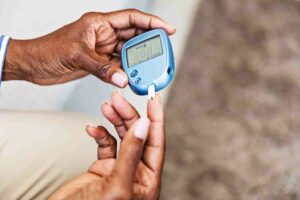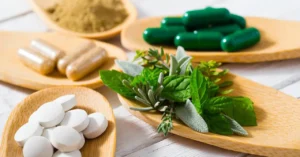Hypoglycemia can be challenging, as it involves maintaining stable blood sugar levels to ensure overall health and well-being. While medication is often necessary, several natural approaches can complement conventional treatments and help manage hypoglycemia effectively. In this blog, we’ll explore various hypoglycemia natural treatment options and lifestyle changes that can support those dealing with hypoglycemia, providing insights and strategies for stability and wellness.
Contents
Can Hypoglycemia Be Reversed Naturally?
 While hypoglycemia cannot typically be “reversed” in the sense of permanently eliminating the underlying cause, it can often be effectively managed and its symptoms mitigated through natural approaches. Lifestyle modifications can play a significant role in stabilizing blood sugar levels. Additionally, regular physical activity helps improve insulin sensitivity and promotes better glucose utilization by the body. Eventually, contributes to overall glycemic control.
While hypoglycemia cannot typically be “reversed” in the sense of permanently eliminating the underlying cause, it can often be effectively managed and its symptoms mitigated through natural approaches. Lifestyle modifications can play a significant role in stabilizing blood sugar levels. Additionally, regular physical activity helps improve insulin sensitivity and promotes better glucose utilization by the body. Eventually, contributes to overall glycemic control.
Moreover, certain herbal remedies and supplements have shown promise in helping to manage blood sugar levels. While these natural interventions may not entirely reverse hypoglycemia, they can complement conventional treatments and contribute to better control of symptoms. However, individuals with hypoglycemia need to work closely with healthcare professionals to tailor a comprehensive treatment plan that addresses their specific needs and ensures optimal management of this condition.
What Are The Most Effective Hypoglycemia Natural Treatment Options?
When exploring hypoglycemia natural treatment options, several strategies have shown effectiveness in managing blood sugar levels and minimizing symptoms.
Dietary Changes
A balanced diet is foundational for managing hypoglycemia naturally. Complex carbohydrates like whole grains, fruits, and vegetables provide a steady release of glucose into the bloodstream, preventing rapid spikes and crashes in blood sugar levels. These foods also contain essential nutrients, fiber, and antioxidants, supporting overall health. Additionally, including lean proteins in meals helps slow down the digestion of carbohydrates, leading to more stable blood sugar levels.
Regular Physical Activity
Exercise is a potent tool for managing blood sugar levels naturally. Regular physical activity helps increase insulin sensitivity, allowing cells to better absorb glucose from the bloodstream and utilize it for energy. Both aerobic exercises like walking, jogging, or cycling, and strength training activities such as weightlifting or resistance exercises can be beneficial for individuals with hypoglycemia. Aim for at least 150 minutes of moderate-intensity aerobic activity or 75 minutes of vigorous-intensity aerobic activity per week, spread across several days.
Stress Management
Chronic stress can significantly impact blood sugar levels by triggering the release of stress hormones like cortisol and adrenaline, which can raise blood sugar levels. Implementing stress management techniques can help mitigate these effects and improve overall glycemic control. Practices such as mindfulness meditation, deep breathing exercises, progressive muscle relaxation, yoga, or tai chi can promote relaxation and reduce stress levels. Establishing a regular relaxation routine and incorporating these techniques into daily life can help individuals better cope with stress and its impact on blood sugar regulation.
Herbal Remedies and Supplements
 Several herbs and supplements have been studied for their potential benefits in supporting blood sugar regulation. Cinnamon, for example, has been shown to improve insulin sensitivity and enhance glucose uptake by cells. Fenugreek seeds contain soluble fiber and compounds that may help lower blood sugar levels and improve glycemic control. Bitter melon extract has also demonstrated antidiabetic properties, aiding in the regulation of blood sugar levels. Moreover, supplements like chromium, magnesium, and alpha-lipoic acid may help improve insulin sensitivity and support overall metabolic health.
Several herbs and supplements have been studied for their potential benefits in supporting blood sugar regulation. Cinnamon, for example, has been shown to improve insulin sensitivity and enhance glucose uptake by cells. Fenugreek seeds contain soluble fiber and compounds that may help lower blood sugar levels and improve glycemic control. Bitter melon extract has also demonstrated antidiabetic properties, aiding in the regulation of blood sugar levels. Moreover, supplements like chromium, magnesium, and alpha-lipoic acid may help improve insulin sensitivity and support overall metabolic health.
Adequate Sleep and Hydration
Quality sleep and proper hydration are often overlooked but essential aspects of managing hypoglycemia naturally. Sleep deprivation can disrupt hormone levels, including those involved in blood sugar regulation, leading to insulin resistance and higher blood sugar levels. Aim for 7-9 hours of uninterrupted sleep each night, and establish a consistent sleep schedule to support optimal metabolic function. Also, staying well-hydrated by drinking plenty of water throughout the day helps maintain proper hydration levels. This is crucial for overall health and can aid in stabilizing blood sugar levels.
While these hypoglycemia natural treatment options can be effective in managing hypoglycemia, it’s essential to consult with a healthcare professional before making significant changes to your diet or lifestyle. Especially if you’re taking medication or have underlying health conditions. A personalized approach that combines natural therapies with conventional treatments can provide the best outcomes for managing hypoglycemia effectively.
What Foods Treat Hypoglycemia?
When managing hypoglycemia through dietary choices, it’s essential to focus on foods that help stabilize blood sugar levels and provide sustained energy throughout the day. Here are some examples of foods that can be beneficial for individuals with hypoglycemia:
Complex Carbohydrates
Foods rich in complex carbohydrates provide a slow and steady release of glucose into the bloodstream, helping to prevent rapid spikes and crashes in blood sugar levels. Examples include:
- Whole grains: Brown rice, quinoa, barley, oats, whole wheat bread, and whole grain pasta.
- Legumes: Lentils, chickpeas, black beans, kidney beans, and peas.
- Starchy vegetables: Sweet potatoes, potatoes, squash, and pumpkin.
Fiber-Rich Foods
Fiber slows down the digestion and absorption of carbohydrates. This can help stabilize blood sugar levels and promote satiety. Include plenty of fiber-rich foods in your diet, such as:
- Fruits: Berries, apples, oranges, pears, and kiwi.
- Vegetables: Broccoli, spinach, kale, Brussels sprouts, and carrots.
- Nuts and seeds: Almonds, walnuts, chia seeds, flaxseeds, and pumpkin seeds.
Lean Proteins
Protein helps slow down the digestion of carbohydrates, leading to a more gradual release of glucose into the bloodstream. Incorporate lean protein sources into meals and snacks, such as:
- Poultry: Chicken breast, turkey breast, and lean cuts of turkey or chicken.
- Fish: Salmon, trout, tuna, sardines, and mackerel.
- Plant-based proteins: Tofu, tempeh, edamame, and seitan.
Healthy Fats
Including sources of healthy fats in your diet can help increase satiety and stabilize blood sugar levels. Opt for unsaturated fats, such as:
- Avocados
- Nuts and seeds
- Olive oil
- Fatty fish like salmon and mackerel
Low-Glycemic Index Foods
Foods with a low glycemic index (GI) are digested and absorbed more slowly, resulting in a gradual increase in blood sugar levels. These include:
- Non-starchy vegetables: Leafy greens, cucumbers, bell peppers, tomatoes, and cauliflower.
- Berries: Strawberries, blueberries, raspberries, and blackberries.
- Whole grains: Steel-cut oats, barley, bulgur, and quinoa.
Regular Meal Timing
Eating regular meals and snacks throughout the day helps maintain stable blood sugar levels and prevents dips that can lead to hypoglycemia. Aim to eat every 3-4 hours and include a combination of carbohydrates, protein, and healthy fats in each meal or snack.
It’s important to note that individual responses to food can vary. So it may be helpful to monitor blood sugar levels and consult with a healthcare professional or registered dietitian to tailor a dietary plan that meets your specific needs and preferences.
What Is The Best Drink For Hypoglycemia Natural Treatment?
 When managing hypoglycemia naturally, it’s important to choose beverages that won’t cause rapid spikes or drops in blood sugar levels. The best drinks for hypoglycemia natural treatment are those that provide hydration without containing excessive amounts of sugar or refined carbohydrates. Here are some options:
When managing hypoglycemia naturally, it’s important to choose beverages that won’t cause rapid spikes or drops in blood sugar levels. The best drinks for hypoglycemia natural treatment are those that provide hydration without containing excessive amounts of sugar or refined carbohydrates. Here are some options:
- Herbal Tea
Herbal teas such as chamomile, peppermint, ginger, or cinnamon are soothing and hydrating options that can be enjoyed hot or cold. These teas are naturally caffeine-free and contain little to no carbohydrates, making them suitable for managing blood sugar levels.
- Green Tea
Green tea is another excellent option for individuals with hypoglycemia. It contains antioxidants and compounds like catechins that may help improve insulin sensitivity and regulate blood sugar levels. Opt for unsweetened green tea to avoid added sugars.
- Vegetable Juice
Freshly squeezed vegetable juices, such as cucumber, celery, kale, spinach, and carrot juice, can provide hydration along with essential vitamins, minerals, and antioxidants. However, it’s important to be mindful of portion sizes and avoid adding fruits or sweeteners that can increase the sugar content.
- Low-Sugar Smoothies
Homemade smoothies made with low-sugar fruits like berries, avocado, and leafy greens can be a nutritious option for individuals with hypoglycemia. Blend with unsweetened almond milk, coconut water, or plain yogurt for added hydration and creaminess. Avoid using excessive amounts of high-sugar fruits or sweetened ingredients.
- Coconut Water
Coconut water is a natural source of electrolytes and hydration that contains minimal carbohydrates and sugars. It can be a refreshing option for rehydrating after physical activity or during hot weather. However, be mindful of portion sizes as coconut water still contains some natural sugars.
- Infused Water
Infusing water with fresh herbs, fruits, or vegetables can add flavor without the added sugars found in many flavored beverages. Try adding slices of cucumber, lemon, lime, mint, or berries to your water for a refreshing and hydrating drink.
It’s important to read labels and avoid sugary beverages such as soda, fruit juices, energy drinks, and sweetened teas, as these can cause rapid spikes and crashes in blood sugar levels.
Conclusion
In conclusion, hypoglycemia natural treatment involves making mindful choices about diet, lifestyle, and hydration to support stable blood sugar levels and overall well-being. By focusing on whole foods rich in complex carbohydrates, lean proteins, and healthy fats, individuals can provide their bodies with sustained energy and avoid spikes and crashes in blood glucose. Regular physical activity, stress management techniques, and adequate sleep are also essential components of a holistic approach to hypoglycemia management.
Choosing hydrating beverages helps maintain hydration without contributing to blood sugar fluctuations. By incorporating these strategies into daily life and seeking guidance from professionals as needed, people can effectively manage hypoglycemia and optimize their health naturally. Do you want to get rid of diabetes? Join our online diabetes treatment program and reverse Diabetes naturally through lifestyle changes such as a Personalized Diet plan, Exercise, Yoga, dieticians, and health coaches.

